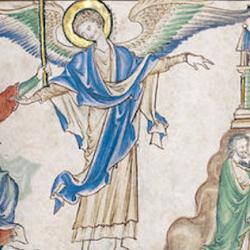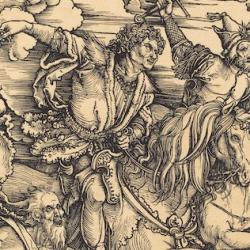In a 2000 article in JBL , Leonard Thompson points out how frequently Jesus is connected with death in the book of Revelation. He is the “firstborn of the dead” (1:5, 18; 2:8) and the slain Lamb (5:6). His blood is highlighted throughout the book (1:5; 5:9, 12; 7:14; 12:11; 19:13), and Christians are also called to remain faithful to death, willing to shed their blood for Jesus who shed His blood for them.
For Thompson, this is part and parcel of John’s purpose of showing that Jesus is a hero, whose life and death parallel the lives of the heroes of Greece and Rome. He notes the parallels with the story of Aeacus in particular:
“The hero Aeacus makes a better fit with Christ than any in that group, for he, like Christ, lived a mortal life, died, and then took authority over Hades. Aeacus was a most pious man . . . who helped to build the walls of Troy (Pind. Ol 8.35; Apollod. 3.12.6). After his death, his primary cult site was on the island of Aigina. From there, Greeks sought his aid at various times, for example, the Thebans when they fought against Athens and the Greeks prior to the battle at Salamis (Herod. 5.80; 8.64). Plutarch describes ‘phantoms and the shapes of armed men coming from Aegina with hands out stretched to protect the Greek ships’ (Plut. Them. 15).55 Several writers, includ ing Clement of Alexandria, mention that Aeacus ended a severe drought in Greece by praying to Zeus for rain, though Clement says that the anecdote was stolen from the OT.”
Most importantly, after his death, Aeacus is given the power to manage the underworld. He has the keys of Hades: “In language similar to Rev 1:18, Aeacus is also said to hold the keys of Hades. An epitaph of an agnostic (third or fourth century after Christ) rejects traditional notions about the underworld: ‘There is no boat in Hades, no ferry man Charon, no Aiakos [Aeacus], holder of the keys . . . , no dog Cerberus. All of us who have died and gone below are bones and ashes, nothing else.’ Finally, Apollodorus completes a brief résumé of Aeacus’s life by saying that he ‘keeps the keys of Hades’ (3.12.6).”
Thompson notes that anti-Christian pagans like Celsus early on noted the parallels between Christian testimony about Jesus and Greco-Roman heroic tales. Origen’s response is telling: “Origen argues in response that if Celsus ‘maintains that the persons he has named were demons, heroes, or gods [then] he has proved the very thing he does not want to accept: namely, that Jesus was a person of a similar nature’ (Cels. 3.34-35). Origen goes on to assert that Jesus is more powerful than the others, but he does not deny comparability.”
All the hopes of the ancient world come to fulfillment in Jesus: He is the greater Moses, greater David, greater Jeremiah, greater Aeacus.














